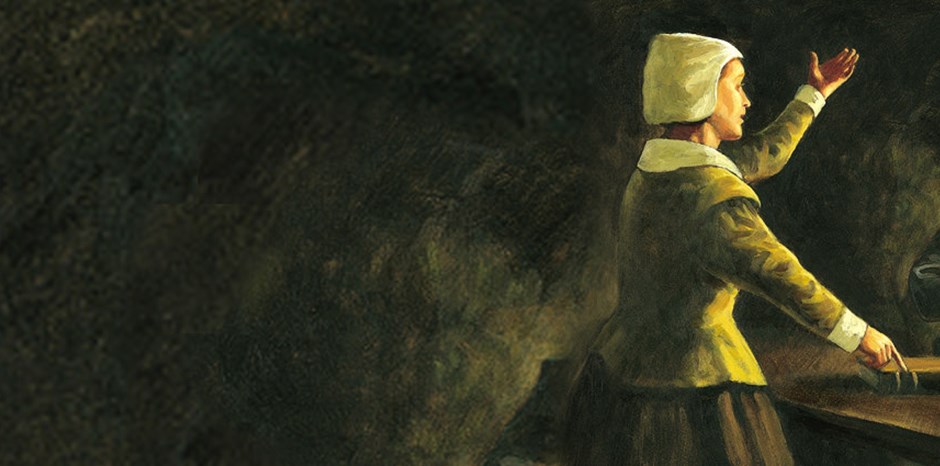For centuries women have fought against numerous injustices forced upon them because of their gender. Some of these injustices include the right to be seen as an equal to men, the right to vote, and the right for equal pay, along with many more. Although women have succeeded in breaking down some of these barriers, there are still many inequalities being fought today. During the seventeenth century, there was one woman in particular who battled in opposition to social injustice: Anne Hutchinson. This article is about the life of a brave woman who opposed an unfair law forbidding men and women from freely practicing their religion, and who also challenged the preposterous roles women were limited to in the religious community.

Anne Hutchinson, maiden name Anne Marbury, was born July 20, 1591, in Alford, England. She was the daughter of a midwife and a Cambridge scholar who published many unorthodox religious texts. In fact, Francis Marbury’s teachings were banned from where he was a teacher, at Saint Wilfred’s School in Alford. After vigorous pleading, Marbury was able to have the ban lifted, and he began teaching again in 1602. 1 Perhaps this is where Anne inherited her tenacious spirit to express her opinion. In 1605, at the young age of fourteen, Anne and her family moved to London for her father’s new position as rector of Saint Martin’s Vintry, leaving behind Anne’s boyfriend, a tailor named William Hutchinson. After the death of Anne’s father in 1611, Hutchinson moved to London to be with Anne; the next year the two were married. That same year, the newlywed bride returned to Alford where her husband continued his tailor business, and Anne followed in her mother’s footsteps as a midwife. Anne and William went on to raise thirteen children together in Alford. 2
In 1612, newly ordained Puritan minister John Cotton began preaching at Saint Botolph’s Church in Boston, Lincolnshire, not far from Alford where Anne Hutchinson resided. His unique approach greatly intrigued Hutchinson. 3 Cotton’s preaching and his understandings of religion reminded Anne of her father’s teachings. Anne enjoyed Cotton’s work so much, that in 1633, when Cotton immigrated to New England, Anne convinced her husband to move there as well. In 1634, Anne and her family made the long transition to Massachusetts. 4
The following year, in 1635, Hutchinson began holding weekly gatherings in her home to discuss minister Cotton’s sermons. Anne and her followers addressed their beliefs of sheer grace as opposed to the Calvinist theological viewpoint of predestination. Hutchinson and her followers believed that God alone grants salvation to whomever He believes is worthy of His grace, without human interaction. The clergy in New England taught that people could gain God’s grace by willingly performing various covenant conditions, such as performing good deeds, reciting prayers, attending church, along with other forms of religious practice. 5 Anne’s critics called her teachings Antinomianism. The Greek word is translated as “hostile to the law.” Anne provoked the colony leaders by proclaiming that members of their clergy who had not undergone a conversion experience had no authority to be held responsible for the spiritual offices of the colony. She also brought attention to the common yet unfair assumptions of women’s roles within Puritan society. 6 Anne’s following continued to grow, and it became so significant that in the 1636 governor’s election, the colony prevented the reelection of the current governor John Winthrop, and elected Sir Henry Vane the Younger into office. Sir Henry was an outspoken supporter of Anne’s movement, and he was a strong supporter of the anti-Winthrop movement.

Anne’s rising popularity caused three major problems for the colonial leaders. First, Anne’s gatherings paralleled preaching, which was strictly limited to those with a licence, and was absolutely forbidden to women. Second, the New England clergy was putting forth great effort in order to establish a unified church. Anne’s teachings contradicted their efforts. Third, Anne’s supporters consisted of both men and women. This act challenged the status quo of men being the only influential figures within society. 7 Never before had a woman caused so much trouble for authority figures, nor had a woman been the leader of a huge support of individuals.
The turning point of Anne’s momentum occurred during the governor election in May 1637, when former governor John Winthrop was reelected to office. It is not difficult to understand why Winthrop put Hutchinson on trial for heresy when he took office in November. 8 Winthrop was desperate to regain social order within the colony. The trial was held publicly to make an example out of Hutchinson, to show what happens to those who oppose the church and therefore oppose the colonial leadership. Anne surprised many with her witty banter and intellectual remarks. She defended herself quite impressively, proving her knowledge of the Bible and religious laws, and also by providing evidence demonstrating that her accused charge was based on more circumstantial evidence than proven facts of illegal activity. For example, the court tried to charge her with sedition, or an action suggesting discontent or rebellious actions against the government. Hutchinson made it clear that expressing opinions and holding conversations within a women’s meeting was not an illegal act. The statements made within those meetings were confidential because they were held in the privacy of her home. The spectacle of a self-educated woman verbally battling a governor who was a Cambridge scholar on an equal level was unheard of. Despite Hutchinson’s efforts, she was still convicted and banished from the colony. Anne was at a disadvantage from the start with civil officers, elected deputies, and clergymen represented as the jury in the trial. 9 After the verdict, Anne, her family, and a few loyal followers migrated to Rhode Island for a short while before settling in the Dutch colony of New Netherlands, which subsequently became New York. In 1643, Anne and her family became victims of an Indian uprising and were killed during the attack.

Anne Hutchinson is seen as one of the first female feminist who fought for religious freedom. Anne’s actions represent a right established to us as Americans in 1791. The first amendment to the Constitution established the freedoms of religion, assembly, speech, press, and petition. Anne’s reasons for refusing to conform to colonial authorities were reasonable and respectable. She was not the only person to fight for individual freedoms; but her courageous start led the way for others to fight against injustices too.
- John R. Holmes, “Anne Hutchinson,” Salem Press Biographical Encyclopedia (January 2016), 1. ↵
- Holmes, “Anne Hutchinson,” 1. ↵
- Francis J. Bremer, “John Cotton,” Salem Press Biographical Encyclopedia (2016), 1. ↵
- Holmes, “Anne Hutchinson,” 1. ↵
- James F. Cooper, Jr., “Anne Hutchinson and the ‘Lay Rebellion’ against the Clergy,” The New England Quarterly, Inc 61, no. 3 (September 1988): 382-383. ↵
- Alan Brinkley, American History, 15th ed., vol. 1: to 1865 (2 Penn Plaza, New York, NY 10121: McGraw Hill Education, 2015), 45. ↵
- Holmes, “Anne Hutchinson,” 1. ↵
- Alan Brinkley, American History, 45. ↵
- Lisa McGunigal, “The Criminal Trial of Anne Hutchinson: Ritual, Religion, and Law,” Mosaic: A Journal for the Interdisciplinary Study of Literature 49, no. 2 (June 2016): 1-8. ↵



133 comments
Matthew Wyatt
This piece is a well-researched account of the life of, not only an important woman, but an important historical figure in general. My main advice for purposes of revision is an old writing adage: “Show them, don’t tell them.” In the first paragraph you use the phrase “this article is about…” and then proceed to tell the reader what the article is about rather than showing them what it’s about. I realize this may seem nitpicky, but a significant amount of power is taken away from this piece by the inclusion of that sentence. Excluding it will make the writing sound more professional and, as a result, make an already well written piece even better.
Vanessa Tombo
An incredibly well-written story about one of the first females feminist Anne Hutchinson. A woman who stood to her values in the face of adversity and fought for people to have some of the rights that some take for granted or do not even choose to acknowledge. She fought for individual freedoms and did not conform to the Crown’s tyranny.
Cheyanne Redman
I feel that without Anne Hutchinson, woman would still cower behind men and not stand up for what they believe. I find it sad that women continue to face such adversity and still face some of the same problems as the first wave feminist. They may vary in entirety but they are deep down some of the same causes. This article really points out that Anne was the kickstart to the feminist movement to creating a more equal society.
Noah Laing
I was familiar with Anne Hutchinson’s story, but this article made me see how exactly she went about accomplishing her goals and the determination the drive her. As I read this I was reminded of Martin Luther King Jr. several times, as both individuals made a difference by using their words and taking strong stances that helped empower other people, which helped solidify both of their legacies.
Natalie Childs
I had heard of Anne Hutchinson before reading this article, but never knew very much about her. It was really interesting that she followed a pastors teaching so devoutly that she up and moved across the ocean to follow him to New England. From there, the fact that she was able to garner such a following as to change the course of an election is astounding. Even though when Wintrop took back office and had Anne banished, she truly was a spearhead for change for not only religion, but women as well.
Nathan Hudson
This article was very well-written and I enjoyed reading it. It is very impressive what someone can accomplish with a right goal in mind. It is very powerful to read about someone who knows how to fight for what she wants. She didn’t go to violence, she didn’t spread hate, she spoke about what she believed in and still loved others who didn’t believe the same. There are too many instances today that when people want something, they use ignorance, hate, and violence to get it. When the most powerful way is to believe what you believe and persuade people with smart conversations.
Ana Gonzalez
Great article, very well written! Anne Hutchinson was definitely a feminist and her story should be told. It is very inspiring to read about how she stood up to the patriarchy and preached her beliefs about how God will save those who are worth saving. It is a shame however, that Hutchinson had to suffer such injustices and that she was punished and exiled from her home simply because she stood up against a male- oriented society. I am glad that times have improved since then and that we have women of history like Anne Hutchinson to follow.
Angelica Padilla
This is the first time I’ve heard of Anne Hutchinson, and the role she played. It is nice to hear what she accomplished in our society. This is a very well written article! During her time, women were treated extremely unequal, but Hutchinson shows how women have the ability to make a change and have the ability to use their voice to help make a change to be understood.
Anna Guaderrama
I always knew Anne Hutchinson was a feminist and probably one of the most well-known feminists. However, it’s interesting to read about how she used her intellect and wit to come back in her own defense. Although she was a notable example of striving for equality and fighting for the same rights and freedoms, I do believe the actual foundation of feminism has logical standpoint behind it that everyone should agree with. With today’s society people tend to place feminism too much with radical Femi Nazi’s and fail to realize the fact that feminism is about equality not overcoming men.
Cristina Cabello
I love reading articles about women striving for their beliefs and rights. It is really good to read about these remarkable women. But honestly I like hearing different kinds of stories where people become successful. This article displays the story of Anne Hutchinson very well. I like how at the end the author summarized the whole article within a paragraph. Anne Hutchinson is a very inspirational and historical woman.